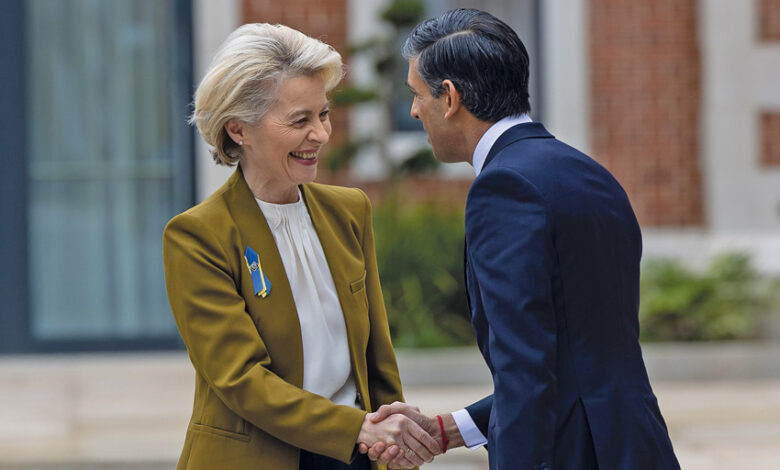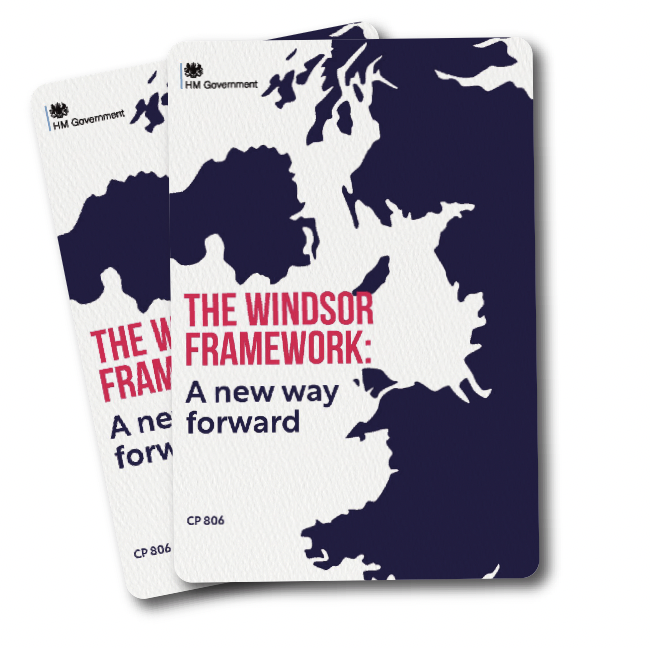The Windsor Framework explained

Post-Brexit arrangements for Northern Ireland have been refined, and despite opposition from the DUP, formal agreement between the UK and the EU has been reached.

Originally designed to mitigate the impact of Brexit on the unique circumstances on the island of Ireland, the Northern Ireland Protocol averted the need for a hard border on the island. However, as it became apparent that checks and controls would instead be shifted to the Irish Sea, the Protocol became politically divisive.
Some interpreted the Protocol as equipping Northern Ireland with distinct economic advantage, with goods able to move from Northern Ireland across the whole of the EU and into Britain, but for others, the Irish Sea border not only threatened the fabric of the United Kingdom but caused practical disruption to some trade coming into Northern Ireland.
The UK’s repeated attempts to renegotiate the legally binding post-Brexit agreement soured its relationship with the EU, but after months of erratic negotiations, and a change of Prime Minister in the UK, the Windsor Framework has been designed to essentially reduce the significance of the Irish Sea border.
Northern Ireland will continue to follow EU rules for goods trade, but the new agreement sets out processes concerning trade, state subsidies, and value added tax, which encourages light-touch regulation.
Trade
The prospect of green and red channels for goods had been proposed as far back as then-Prime Minister Theresa May’s ‘backstop’ agreement but, until now, failed to emerge out of a variety of objections levelled at any formal agreement to date. The Windsor Framework, however, has successfully navigated a potential Conservative Party backbench rebellion in the UK, meaning that goods coming from Great Britain to Northern Ireland will undergo less scrupulous (green lane) checks, than those destined for the Republic of Ireland and the EU single market (red lane).
One of the mechanisms for enabling this is a trusted trader scheme which, according to the EU, promises “an unprecedented reduction” of customs paperwork. “Not for EU” labels on agri-food products will see the EU accept UK public health standards in Northern Ireland, allowing products such as meat to travel from Great Britain to Northern Ireland. The successful evolution of the application of such labels promises the prospect of identity checks on consignments falling to as low as 5 per cent by 2025.
The EU’s leniency is contingent on the UK’s agreement to share near-real-time customs data, which can then be used to identify any divergence or fraud. On both sides of the negotiations, these steps were being welcomed as having greatly reduced the number of checks that will take place once the implementation of the labels is complete in 2025. British Prime Minister Rishi Sunak MP has asserted that the changes “removed any sense of a border in the Irish Sea”.
Agreement that parcels and online deliveries from Great Britain to Northern Ireland will not require customs paperwork has been welcomed. Businesses using approved parcel carriers will also be party to simplified customs procedures, while those were forced to pay tariffs for the importation of specific types of British-made steel following a change to EU quota rules will no longer have to pay said tariffs.
Another key stumbling block that has been overcome has been the standoff over VAT, with Sunak having said during his time as Chancellor of the Exchequer that it would be unacceptable for Northern Ireland to not adopt UK VAT rate changes. Northern Ireland will now be included in UK VAT rate changes, but in return the UK Government has agreed not to undercut minimum EU VAT rates, except for on immovable objects, such as household solar panels, with a comprehensive list of such items to be excluded to be drawn up in the next five years.

State aid
Meanwhile, Article 10 of the Protocol, which stipulated that any subsidy decisions that would affect the goods trade in Northern Ireland would have to be referred to the EU for approval, had been consistent source of unionist and British hostility, with suggestions that it amounted to a violation of the sovereignty of the UK.
While Article 10 has remained intact through the negotiations, the UK Government has said that “stringent” tests will now apply, placing 98 per cent of the subsidies for Northern Ireland beyond the reach of the EU.
The role of Northern Ireland’s institutions
Much attention has been allocated by both the media and the political parties to the Stormont Brake, a mechanism designed to assuage unionist fears that the Protocol would mean that the laws of the EU would be automatically implemented in Northern Ireland. Criticised as a token gesture to give the illusion of sovereignty in some quarters, the Stormont Brake is thus designed to allow the Assembly to apply an “emergency brake” in “exceptional circumstances” if 30 MLAs from at least two parties vote to block the adoption of EU single market rules.
The brake will mean that any rule that provokes a one-third rejection will then be referred to Westminster and Brussels for discussion, with the EU obligated to take “remedial measures” if Westminster decides not to implement measures the EU deems necessary.
The mechanism could possibly open the door for the DUP’s return to the institutions. For instance, there is a possibility that the party could leverage unequivocal backing from the Westminster government on such challenges – which is not a given despite how it may be portrayed – in exchange for returning to Stormont. Westminster has said that it will legislate to ensure it will take account of Stormont demands in the event of the brake mechanism being triggered.
The union
Likewise, bureaucratic red tape that had been the source of unionist perceptions that the Protocol had diminished the equality of Northern Ireland’s place within the UK have also been addressed. For instance, having previously needed to be microchipped and in possession of a passport to travel from Britain to Northern Ireland, pets will now only require a travel document. Similarly, medicines approved for use in the UK that have not yet been approved for use in the EU will now be available in Northern Ireland, and seed potatoes and plants banned from importation for fear of diseases carried will now be able to move freely to Northern Ireland under a special plant health label.
The European Court of Justice
Among the most strident demands of unionists and the maximalist Brexit wing of the Conservative Party has been the end of the jurisdiction of the European Court of Justice (ECJ) over Northern Ireland and an end to the court’s role as the Protocol’s adjudicator. The Windsor Framework does not achieve this and neither does it deliver on another key unionist demand for the creation of a dispute resolution mechanism with international arbitration.
Westminster has instead argued that the implementation of the green lane trading system and its narrowing of the number of EU laws that will apply to Northern Ireland – reducing the total by some 1,700 pages – mean that the original Protocol deal will no longer apply to Northern Ireland and only 3 per cent of EU law will be applicable.
The command paper published by the British Government explains its position: “The rules that do apply are there solely, and only as strictly necessary, in order to maintain the unique ability for Northern Ireland firms to sell their goods into the EU market.”





